How to Stop a Dog from Licking Paws
If you’re a Labrador owner, you may have noticed your furry friend incessantly licking their paws. While occasional grooming is normal, excessive paw licking can lead to various consequences for Labradors. In this article, I’ll share some valuable insights on how to stop a dog from licking their paws and shed light on the potential repercussions for Labradors.
Labradors are known to be prone to allergies and skin sensitivities, which can contribute to excessive paw licking. This behaviour often stems from discomfort caused by itching, irritation, or inflammation. If left unchecked, continuous licking can lead to further complications such as hot spots, infections, and even self-inflicted injuries.
So, how can you alleviate this issue? One effective strategy is identifying the underlying cause of the paw licking. It could be due to environmental allergens like pollen or certain foods in their diet. Regular visits to the veterinarian can help pinpoint any allergies or medical conditions that may be triggering this behaviour.
Additionally, providing proper paw care is essential in preventing excessive licking. Keeping your Labrador’s paws clean and dry will minimise irritants and reduce the urge to lick excessively. You can also consider using specialised products like paw balms or protective boots that create a barrier between your dog’s paws and potential allergens.
By understanding the reasons behind your Labrador’s paw licking habit and taking proactive measures to address it, you can ensure their comfort and well-being while avoiding potential consequences down the line. With patience and consistent effort, you’ll be able to break this cycle and help your furry companion enjoy healthier paws once again.

Common Reasons for Dogs Licking Their Paws
As a dog owner, I’ve often wondered why my Labrador retriever has a habit of constantly licking their paws. After some research and consulting with experts, I’ve discovered several common reasons behind this behaviour. Understanding these reasons can help us address the issue effectively.
- Allergies: One of the most prevalent causes of excessive paw licking in Labradors is allergies. These can be triggered by various factors such as food sensitivities, environmental allergens like pollen or dust mites, or even certain materials your dog comes into contact with. Identifying and eliminating the allergen can help alleviate the paw licking.
- Skin Irritation or Infections: Labradors are prone to skin irritations and infections, which may lead to discomfort and excessive paw licking. This could be due to bacterial or fungal infections, hot spots, or even dry skin conditions. Regularly checking your dog’s paws for any signs of redness, swelling, or sores is crucial in identifying potential issues.
- Boredom or Anxiety: Just like humans bite their nails when they’re nervous or bored, dogs may lick their paws as a way to cope with stress or boredom. Labradors are energetic breeds that require mental stimulation and physical exercise to prevent them from getting anxious or restless.
- Pain or Injury: If your Labrador is experiencing pain in their paws due to an injury like a cut, splinter, sprain, or even arthritis, they may resort to excessive licking as a way of relieving discomfort. Regularly inspecting your dog’s paws for any signs of injury is crucial in addressing this issue promptly.
- Parasites: Fleas and ticks can cause irritation on your Labrador’s paws and prompt them to lick excessively in an attempt to alleviate itching caused by these parasites.
- Behavioral Habit: Some Labradors develop a habit of licking their paws out of boredom or as a self-soothing mechanism, even when there are no underlying medical issues. This habit can be challenging to break and may require redirection or professional training.
Understanding the common reasons behind your Labrador’s paw licking is the first step towards finding an appropriate solution. However, it’s essential to consult with your veterinarian for a proper diagnosis and guidance tailored to your dog’s specific needs. By addressing the underlying cause, you can help your furry friend find relief and prevent any potential consequences associated with excessive paw licking.